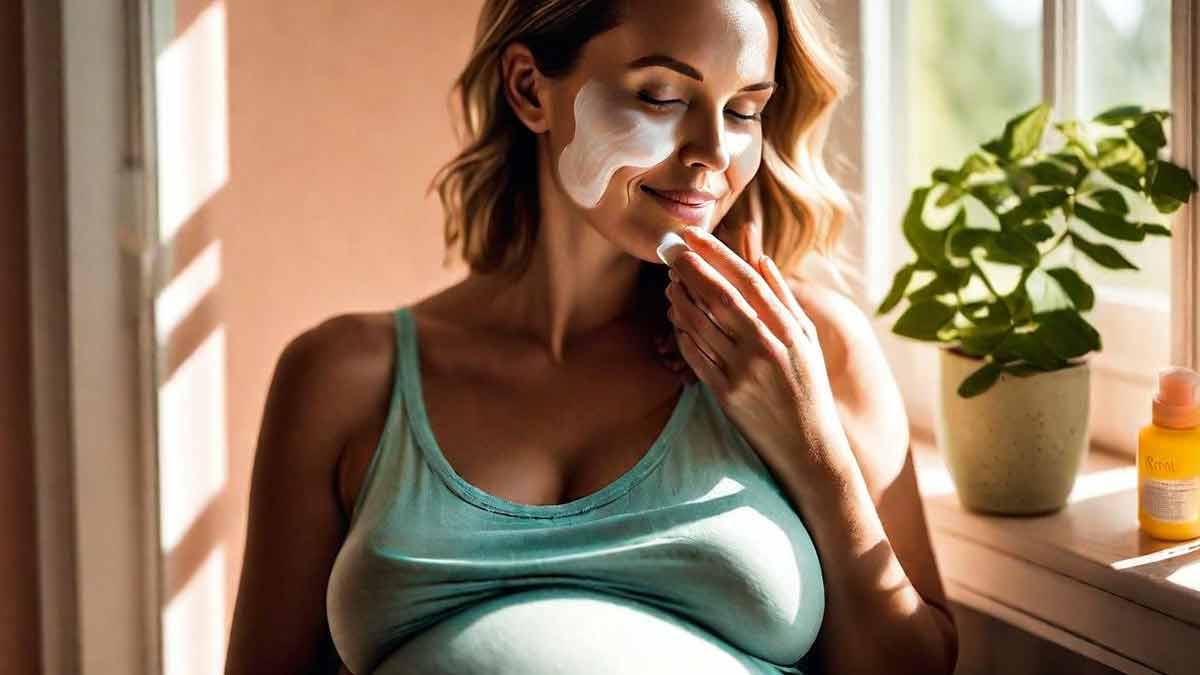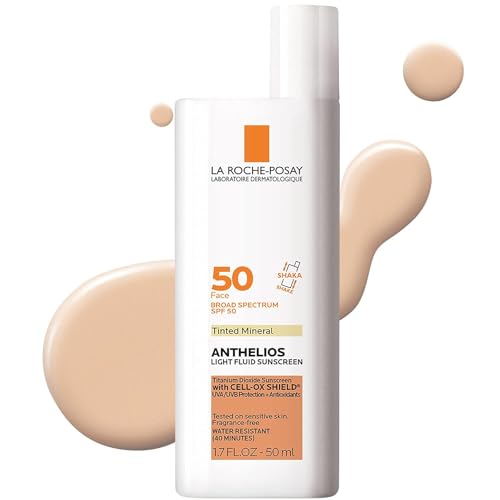During pregnancy, your skin isn’t just glowing; it’s also more vulnerable. With increased sensitivity and the potential for pigmentation issues like melasma (those pesky dark spots on your face), sun protection should be high on your to-do list. Here’s where mineral sunscreens step in, becoming the go-to over their chemical counterparts.
Why? Well, mineral sunscreens, which contain zinc oxide and titanium dioxide as the active ingredients, sit on top of your skin to physically block those harmful UV rays. They’re not just safer for you and your baby, but also effective in warding off skin cancer and those not-so-cute signs of premature aging. Remember, sun damage is cumulative, so consistent protection is key. Are you using the safest sunscreen for your pregnancy journey?
More from Glowing Gorgeous: Find out here the Best Silicone-Free Moisturizers And Why Do You Care
Glowing First Glimpse
- Mineral sunscreens are the safest choice during pregnancy, offering protection without harmful chemicals.
- The La Roche-Posay Anthelios Sunscreen is highly recommended for its safety, effectiveness, and ease of application.
- Regular application and reapplication of sunscreen are crucial, along with wearing protective clothing and seeking shade.
- Always consult with a healthcare provider for personalized advice on sunscreen use during pregnancy.
Sunscreen Safety and Effectiveness
Chemical vs. Mineral Sunscreen
When we talk about sunscreen, there are generally two types we refer to: chemical and mineral. Chemical sunscreens work by absorbing UV rays and then transforming them into heat, which is released from the skin. Their active ingredients can include avobenzone, octisalate, and oxybenzone, among others. On the flip side, mineral sunscreens, containing zinc oxide or titanium dioxide, sit on top of the skin and reflect the sun’s rays like a mirror.
It’s these mineral types that come highly recommended for pregnant individuals. This is partly because the FDA acknowledges zinc oxide and titanium dioxide as safe and effective sunscreen ingredients. There’s been quite a bit of buzz around avoiding certain chemical filters, notably oxybenzone, during pregnancy due to potential health concerns.
Deciphering SPF and Broad Spectrum Protection
Understanding SPF, which stands for Sun Protection Factor, is crucial for anyone looking to get serious about sun protection. SPF indicates the level of protection a sunscreen provides against UVB rays, the primary culprit behind sunburn. However, it’s not just UVB rays we need to worry about; UVA rays can prematurely age your skin, leading to wrinkles and sunspots, and both types can contribute to skin cancer. This is where broad-spectrum sunscreens enter the picture, protecting against both UVA and UVB rays. For those expecting, it’s generally advised to use sunscreens with an SPF of at least 30 for adequate protection.
Ingredients to Avoid in Pregnancy
Not all sunscreen ingredients are created equal, especially during pregnancy. Along with oxybenzone, pregnant folks should steer clear of retinyl palmitate, a form of vitamin A that the Environmental Working Group (EWG) suggests avoiding in sunscreens due to potential health risks. While the sunscreen ingredient world can be complex, focusing on products with zinc oxide or titanium dioxide as the active ingredient, and without the addition of harmful chemicals, can simplify things and make for a safer pregnancy experience.
Top Picks for Pregnancy-Safe Sunscreens
Best Overall Pregnancy-Safe Sunscreen
For a top-tier sunscreen that meets all the safety and quality demands for pregnancy, the La Roche-Posay Anthelios stands out. The reason it tops the list is its mineral base, primarily using zinc oxide and titanium dioxide as the active ingredients which are recognized for not penetrating the skin barrier, making it a safe option for pregnant individuals.
Added to its safety credentials, the matte finish ensures that those experiencing increased oiliness, a common pregnancy skin issue, can enjoy sun protection without exacerbating skin greasiness. This lightweight formula not merely protects the skin from harmful UV rays but also improves the skin’s appearance without feeling heavy or clogging pores.
Best Budget-Friendly Option
When it comes to finding a sunscreen that is both effective and won’t break the bank, Neutrogena Sheer Zinc Mineral Sunscreen Stick is a standout choice. Its mineral formulation, centered around zinc oxide, ensures broad-spectrum protection without incorporating harmful chemicals, aligning with the Environmental Working Group’s recommendations for pregnancy safety. Affordability does not mean compromise, as this sunscreen offers a high level of sun protection, is water-resistant, and is easy to apply without leaving a white residue, making it an excellent option for those on a budget looking for a reliable pregnancy-safe sunscreen.
Best for Sensitive Skin
For expecting mothers with sensitive skin, the search for a gentle yet effective sunscreen ends with Coola Mineral Body Sunscreen Lotion. Its mineral-based formula, which avoids potential irritants and allergens commonly found in chemical sunscreens, is a boon for sensitive skin types. Its sheer, non-greasy application and vegan composition are noteworthy, providing a comfortable skin feel without compromising on sun protection efficacy. This sunscreen not only protects against the broad spectrum of harmful UV rays but also nurtures the skin with its moisturizing ingredients such as shea butter, enhancing the skin barrier while preventing sun damage.
Best Tinted Option
For those looking to add a bit of complexion enhancement while protecting their skin, EltaMD UV Clear Tinted Face Sunscreen is the ideal choice. This tinted sunscreen offers a flawless glow coupled with pregnancy-safe sun protection, thanks to its mineral shield of zinc oxide and titanium dioxide. It’s a great alternative for individuals seeking a multifunctional product that can provide mild coverage and even out skin tone while ensuring the skin stays guarded against UVA and UVB rays. Its suitability for pregnancy comes from carefully selected ingredients that deliver both protection and a beautifying effect without the risk of harmful chemicals.
Applying Sunscreen Effectively During Pregnancy
Proper Application Techniques
When it comes to using sunscreen during pregnancy, it’s crucial not only what you apply but how you apply it. A common misstep is not using enough sunscreen. Dermatologists suggest using about one ounce (which is approximately enough to fill a shot glass) to cover all exposed areas of the body comprehensively. It’s vital to apply sunscreen at least 15 minutes before heading outdoors to give it enough time to absorb into your skin, offering maximum protection. Furthermore, remember to reapply every two hours, or more frequently if swimming or sweating. Special attention should be paid to often overlooked areas like the face, neck, ears, and hands, as these areas are highly susceptible to sun damage.
More from Glowing Gorgeous: Find out here Hyram’s Recommended Face Sunscreens For The Summer
Combining Sunscreen with Other Protective Measures
While sunscreen plays a significant role in protecting your skin from harmful UV rays, it should not be your only line of defense, especially during pregnancy when your skin may be more sensitive and vulnerable. Wearing protective clothing such as long-sleeved shirts, long pants, or UV protection wear can offer an additional barrier against the sun. Seeking shade and avoiding direct sun exposure during peak hours, between 10 a.m. and 4 p.m., when the sun’s rays are strongest, can significantly reduce your risk of sunburn and skin damage. Accessories such as wide-brimmed hats and UV-blocking sunglasses can not only add extra protection but also enhance your sun-safe outfits, making them both practical and stylish.
Frequently Asked Questions
Can I Use Chemical Sunscreens During Pregnancy?
We get it—navigating the world of skincare during pregnancy can feel like trying to solve a mystery without all the clues. One of the big questions revolves around the use of chemical sunscreens. It’s widely advised to proceed with caution here. Chemical sunscreens can absorb into the skin and potentially affect your body, which isn’t ideal when you’re pregnant. Instead, leaning towards mineral sunscreens, which sit on top of your skin and act as a shield against UV rays, is the safer bet. Look for ones with zinc oxide or titanium dioxide as their active ingredients—they’re your best friends for sun protection that doesn’t require absorbing harmful chemicals.
How Often Should I Reapply Sunscreen?
Just putting on sunscreen isn’t enough—you’ve got to keep the protection going, especially if you’re spending a good chunk of the day outside. Here’s the deal: reapply your sunscreen every two hours. If you’ve been swimming or sweating a lot (thanks, pregnancy glow), it’s time for another round, even if it hasn’t been two hours. Think of it like topping up your drink; only, in this case, you’re topping up your sun protection. Continuous application is crucial to effectively safeguard your skin against those pesky UV rays.
Are There Pregnancy-Safe Sunscreens That Don’t Leave a White Cast?
Nobody wants to look like they’re auditioning for a mime performance after applying sunscreen. Luckily, the days of dealing with that notorious white cast are fading—thanks to sheer, clear, or invisible formulas. Brands like Coola and Supergoop have risen to the challenge, offering sunscreens that blend seamlessly into your skin without leaving behind any residue. These brands have made it possible to protect your skin without compromising on look or feel—proof that sunscreen has come a long way.
Bottom Line on Sunscreen for Pregnancies
When it comes to sun protection during pregnancy, there’s no room for compromise. UV rays don’t discriminate, and pregnant individuals are not an exception to their harmful effects—including the risk of skin cancer and sun damage. This makes choosing the right sunscreen not just a matter of skincare, but a critical aspect of prenatal care.
Mineral-based sunscreens, especially those with zinc oxide or titanium dioxide as their active ingredients, offer broad-spectrum protection without exposing mother and baby to potentially harmful chemicals. These sunscreens block both UVA and UVB rays effectively and are less likely to cause skin issues like irritation, making them the best pregnancy safe sunscreen options out there.
Always opt for products with an SPF of 30 or higher to ensure adequate sun protection. Additionally, before incorporating any new product into your routine, especially during pregnancy, it’s wise to have a discussion with your healthcare provider. By being proactive in selecting safe sunscreen and diligent in its application, you’re not just taking care of your skin; you’re taking an important step in prenatal care for both you and your baby. Let’s remember to prioritize not just our immediate skin health but our overall wellbeing by making informed, safe choices in sun protection during these crucial nine months.
Sources:
– Safety of skin care products during pregnancy – PMC
– The problem with vitamin A | EWG’s Guide to Sunscreens


 La Roche-Posay Anthelios Clear Skin Dry Touch Sunscreen SPF 60, Oil Free Face...
La Roche-Posay Anthelios Clear Skin Dry Touch Sunscreen SPF 60, Oil Free Face... Neutrogena Ultra Sheer Dry Touch SPF 50 Mineral Sunscreen Stick for Sensitive...
Neutrogena Ultra Sheer Dry Touch SPF 50 Mineral Sunscreen Stick for Sensitive... COOLA Organic Mineral Sunscreen SPF 50 Sunblock Body Lotion, Dermatologist...
COOLA Organic Mineral Sunscreen SPF 50 Sunblock Body Lotion, Dermatologist... EltaMD UV Clear Tinted Face Sunscreen, SPF 46 Oil Free Sunscreen with Zinc...
EltaMD UV Clear Tinted Face Sunscreen, SPF 46 Oil Free Sunscreen with Zinc...
 La Roche-Posay Anthelios Melt-In Milk Body & Face Sunscreen SPF 60, Oil Free...
La Roche-Posay Anthelios Melt-In Milk Body & Face Sunscreen SPF 60, Oil Free... La Roche-Posay Anthelios Tinted Sunscreen SPF 50, Ultra-Light Fluid Broad...
La Roche-Posay Anthelios Tinted Sunscreen SPF 50, Ultra-Light Fluid Broad... innisfree Daily UV Defense Sunscreen Broad Spectrum SPF 36 Face Lotion, 1.69 Fl...
innisfree Daily UV Defense Sunscreen Broad Spectrum SPF 36 Face Lotion, 1.69 Fl...
Comments